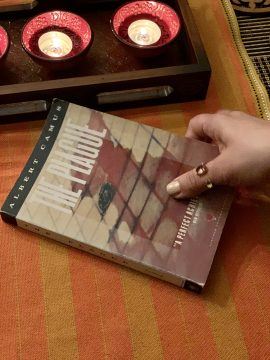by Shadab Zeest Hashmi
“A pestilence isn’t a thing made to man’s measure; therefore, we tell ourselves that pestilence is a mere bogy of the mind, a bad dream that will pass away. But it doesn’t always pass away and, from one bad dream to another, it is the men who pass away…” —Albert Camus (The Plague)

“So long as each individual doctor had come across only two or three cases, no one had thought of taking action. But it was merely a matter of adding up the figures and, once this had been done, the total was startling. In a very few days the number of cases had risen by leaps and bounds, and it became evident to all observers of this strange malady that a real epidemic had set in.” (The Plague, Page 35)
Death by pneumonia, and then another, and another, advancing in only days to large populations— caused by one of those crown-wearing microbes, a Coronavirus, deadly, beautiful under the microscope. They named it Novel Coronavirus. Once unsheathed, it leapt from animal to human, one town to another, then between land and sea borders. The first confirmed case in the United States was recorded on January 20, 2020. Only 20 days ago, we had wished each other peace and a vision clear as 20/20. But is a year of numbers and blurred vision. The Grand Princess sailed with 2000-plus, 21 infected by the time she passed under the Golden Gate Bridge. By March 18th there were 7,769 cases. Ten days later, on March 28th, they had risen to 116,505.
“The evening papers that day took up the matter and inquired whether or not the city fathers were going to take steps, and what emergency measures were contemplated, to abate this particularly disgusting nuisance. Actually the municipality had not contemplated doing anything at all, but now a meeting was convened to discuss the situation.” (The Plague, Page 15)
There was a memo early on, wasn’t there? One of them asked.
The man had no answers, only mirrors and insults inside. He spoke as if swirling in a perpetual drumroll. He appeared every day for the press conference, knotting a bright tie in a different color, head skewed; most days he favored red— red and oversized, as he snarled or shrugged at a question, red as he made his pounce.
“Our townsfolk were not more to blame than others; they forgot to be modest, that was all, and thought everything was still possible for them; which presupposed that pestilences were impossible. They went on doing business, arranged for journeys and formed views. How should they have given a thought to anything like plague which rules out any future, cancels journeys, silences the exchange of views. They fancied themselves free, and no one will ever be free so long as there are pestilences.” (The Plague, Page p37)
Some sneered, making it out to be a tree-hugger hoax, or said something is always the matter with China, or that the virus will float through Asia, snap and fade long before it gets near. The melting of the Arctic is far and slow, the East is authoritarian and vile and slow. Then, there came more disbelief/belief, a bit of dry cough, more cough, a trace of concern but business as usual, same scheduled flights, conferences, concerts, same long cruise lines.
“Next day, April 30, the sky was blue and slightly misty. A warm, gentle breeze was blowing, bringing with it a smell of flowers from outlying suburbs. The morning noises of the streets sounded louder, gayer than usual.” (The Plague, Page 22)
Neither the blue jay nor the wild rabbit fears proximity; the double doors to the patio remain open all day. Under lockdown, the chiming of phones and the occasional vrooming of household appliances are weak inklings of life as we knew it. On this day, in mid-April, already a month since the world stopped cranking, dropped to its knees by the pandemic, birds are making extravagant music, the citrus blossoms give off rich notes of scent in the coastal breeze, the hummingbird’s whir is faster than any motor in sight.
“After retching for some minutes, the man lay back again, gasping. His temperature was 103, the ganglia of his neck and lips were swollen, and two black patches were developing on his thighs. He now complained of internal pains.”
“It’s like a fire. The bastard is burning me inside.”
“He could hardly get the words through his fever-crusted lips and he gazed at the doctor with bulging eyes that his headache had suffused with tears.” (The Plague, Page 21)
The devil in the droplets will come, idling and igniting. The cloud left by a cough will hang like a cloak hiding a stupefying arrow, a roving shock aimed at the lung.
“Everybody knows that pestilences have a way of recurring in the world; yet somehow we find it hard to believe in ones that crash down on our heads from a blue sky. There have been as many plagues as wars in history; yet always plagues and wars take people equally by surprise.”
(The Plague, Page 37)
The sound is techno but grand, in tempo and tininess very much like slow rain on flat metal. It brings to mind bodies recoiling and falling to the ground in slow motion, the panning out of the camera until the smallest flea is more animated than the vast fields of corpses. The song is called “Amnesia.”
